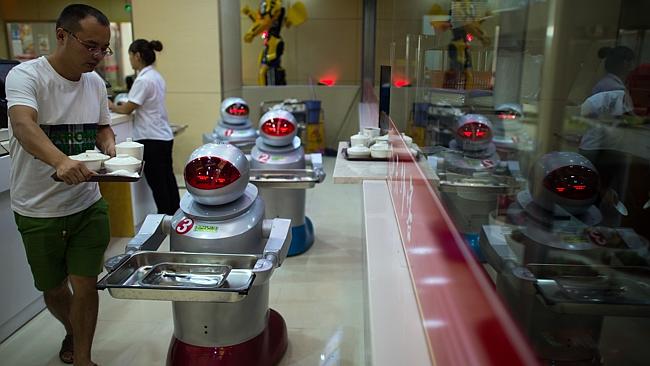Cognitive Lrn&Shr
Latest News / Articles
Robots are transforming workplaces and taking on roles we used to think called for a human's touch, but as they begin to proliferate across the service and hospitality industry, should they be viewed with enthusiasm or with dread?

Credits : A food serving robot
In San Francisco's Cafe X, the barista won't butcher your name, won't call in sick or give you attitude. This one just makes drinks tirelessly, and with robotic precision, because the barista at Cafe X is a robot.
You order your drink through an app or in store, and you're placed in a digital queue. The robot makes your drink, and you pick it up. It can make three drinks in less than a minute, and over 1,000 custom recipes.
Inside the cafe there's no yelling or running, and the only human interaction you'll have is with employees who guide you through the process.
Sam Blum, the Cafe X Marketing and Communications Manager, says one of the biggest benefits of the robots is that, once programmed, they perform instantly and at a high level every day.
The "every day" is key. With the unemployment rate hovering at 3.7%, it's a job-seeker's market.
"Internally and externally there's a lot of pressures that are happening in our economy," says Juan Higueros, Chief Operating Officer of Bear Robotics, a company that makes a food serving robot named Penny. "Labor supply is low and for folks who do these types of jobs, there are many options. Folks are turning to perhaps working in the on-demand economy."
The labor shortage isn't the only reason robots are finding a role in the service sector. There's the question of wages too. In the US, 45 municipalities and 17 states have raised the minimum wage above the federal level of $7.25 an hour. California plans to increase its minimum wage by $1 a year until it reaches $15 in 2022.
In New York, a survey by the New York Hospitality Alliance, an association of restaurants, bars, lounges, and hotels, found that 53.1% of the establishments planned to eliminate jobs in 2019 as a result of mandated wage increases.
In Mountain View, California, a city with a $15 minimum wage, Amici's East Coast Pizzeria is one of the establishments using BearRobotic's Penny. The device has four censors that help it navigate around tables and people, the three-foot robot has a three-tier tray system that allows it to deliver food and drinks, as well as pick up dirty dishes. According to the restaurant's manager, Penny already does 30 to 40 percent of the job of a human server.
And it's not just restaurants turning to robots, hotels are getting in on the action as well. Last year, hospitality workers in Las Vegas threatened to strike, and one of their demands was greater protection against automation.
But Fred Kokash, Director of Sales and Marketing at the Los Angeles Sheraton San Gabriel hotel, says fears of robots stealing people's jobs is overstated. Kokash's hotel currently owns eight robots that perform a variety of jobs, from helping guests find their way around the hotel, to delivering luggage or room service.
"We have not replaced a single job," he says. "A lot of people thought that these robots were going to replace the bellman and replace housekeeping. We've actually added more jobs. The other merit is when the luggage is being delivered, it gives now the bellman more time to interact with the guest when going to the room."
This sentiment is echoed in a report by UK-based think tank Oxford Economics, which concluded that despite the proliferation of robots in the hospitality industry, it is not clear that robots will replace the existing workforce. It said the Vdara hotel in Las Vegas installed robots to work alongside its existing workforce, and at the end of a three-month trial, the employees voted to keep the devices because they found they earned more money in tips.
The report said the rise of robots will boost productivity and economic growth, and lead to jobs in industries that don't yet exist.
But it also warns that existing business models across many sectors will be seriously disrupted, and tens of millions of jobs will be lost.
So should robots be viewed with enthusiasm or dread? It depends on who you ask.
Source: https://www3.nhk.or.jp
Share This:
Read all Latest Online Learning Resources News
Source: https://www3.nhk.or.jp
Copyright © 2018 Cognitive Lrn&Shr . all rights reserved.